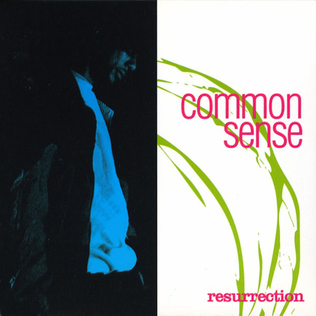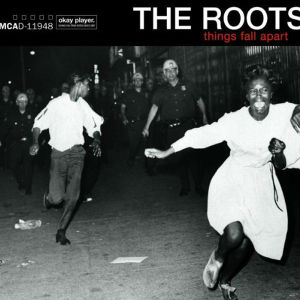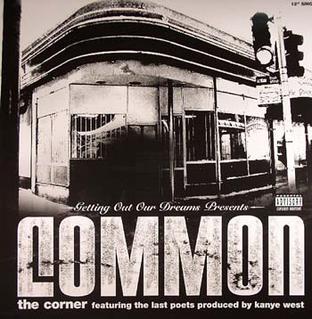
Lana Michele Moorer, better known by her stage name MC Lyte, is an American rapper. Considered one of the pioneers of female rap, MC Lyte first gained fame in the late 1980s, becoming the first female rapper to release a full solo album with 1988's critically acclaimed Lyte as a Rock. The album spawned the singles "10% Dis" and "Paper Thin".

Lonnie Rashid Lynn, known professionally as Common, is an American rapper and actor. He is the recipient of three Grammy Awards, an Academy Award, a Primetime Emmy Award, and a Golden Globe Award. At the age of 20, he signed with the independent label Relativity Records to release his debut studio album Can I Borrow a Dollar? (1992), which was met with critical acclaim along with its follow-ups, Resurrection (1994) and One Day It'll All Make Sense (1997). He maintained an underground following into the late 1990s, and achieved mainstream success through his work with the Black music collective, Soulquarians.

The Blueprint is the sixth studio album by American rapper Jay-Z, released on September 11, 2001, through Roc-A-Fella Records and Def Jam Recordings. Its release was set a week earlier than initially planned in order to combat bootlegging. Recording sessions for the album took place during 2001 at Manhattan Center Studios and Baseline Studios in New York City. Contrasting the radio-friendly sound of Jay-Z's previous work, The Blueprint features soul-based sampling and production handled primarily by Kanye West, Just Blaze, and Bink, as well as Timbaland, Trackmasters, and Eminem, who also contributes the album's sole guest feature.

Hard Core is the debut studio album by American rapper Lil' Kim, released on November 12, 1996, by Undeas Recordings, Big Beat Records, and Atlantic Records. After achieving success with the hip hop group Junior M.A.F.I.A. and their album Conspiracy (1995), Kim began working on her solo album with the Notorious B.I.G. serving as the executive producer. She collaborated with a number of producers, such as Sean "Puff Daddy" Combs, Stevie J., David "Ski" Willis and Jermaine Dupri, among others. Other rappers, including Jay-Z, Lil' Cease and Puff Daddy were featured on the album.

Katrina Laverne Kearse, known professionally as Trina, is an American rapper. She rose to prominence in the late 1990s for her collaborations with Trick Daddy on the singles "Nann Nigga", "Shut Up", and "Take It to da House". In 2000, she released her debut album Da Baddest Bitch. Afterwards, she made an appearance on the remix of "One Minute Man" by Missy Elliott and Ludacris. In 2002, she released the Kanye West-produced single "B R Right" featuring Ludacris, from her sophomore album Diamond Princess (2002).

The Lost Tapes is a compilation album by American rapper Nas. It was released on September 23, 2002, by Ill Will Records and Columbia Records, who wanted to capitalize on what was seen in hip hop music as Nas' artistic comeback the year before, and compiles previously unreleased tracks that were discarded from recording sessions for the rapper's previous studio albums I Am... (1999) and Stillmatic (2001). It features production by L.E.S., The Alchemist, Poke and Tone, and Deric "D-Dot" Angelettie, among others. With low-key, sparse sounds and observational lyrics about urban life, the songs are largely autobiographical and nostalgic, departing from the thug persona of Nas' previous records.

Resurrection is the second studio album by American rapper Common Sense. It was released on October 4, 1994, by Relativity Records. It was mainly produced by No I.D., who also produced most of Common's 1992 debut Can I Borrow A Dollar? It is the last album to feature the rapper's full stage name, as after this album the "Sense" portion of the name was dropped, making the rapper simply known to this day as "Common".

Be is the sixth studio album by American rapper Common. It was released on May 24, 2005, by Geffen Records and GOOD Music. The album is Common's first album under Geffen, following the mediocre performance of 2002's Electric Circus and the July 2003 merger of preceding label MCA Records, which, like Geffen and its sister label Interscope Records, was a division of Universal Music Group.

Things Fall Apart is the fourth studio album by American hip hop band the Roots, released on February 23, 1999, by MCA Records. Recording sessions for the album took place at Electric Lady during 1997 to 1998, coinciding with recording for other projects of the Soulquarians collective, including D'Angelo's Voodoo (2000), Erykah Badu's Mama's Gun (2000), and Common's Like Water for Chocolate (2000). According to Spin magazine, the album became a landmark moment for the Roots and the collective, as it "swelled the Roots clique into a movement-style posse".

Brian Daniel Carenard, better known by his stage name Saigon, is an American rapper. After years of delay due to former record label interference his debut album The Greatest Story Never Told (2011) was released on Suburban Noize Records. He is also known for his appearances on the HBO television series Entourage.

Sittin' on Chrome is the second and final studio album by American hip hop group Masta Ace Incorporated and the third album by Brooklyn-based rapper Masta Ace. It was released on May 2, 1995, through Delicious Vinyl. Recording sessions took place at Firehouse Studios in Brooklyn. Production was handled by Masta Ace under his producer moniker 'Ase One', as well as the Bluez Brothas, Louie "Phat Kat" Vega and Uneek, with Orlando Aguillen serving as executive producer. It peaked at number 69 on the Billboard 200 and number 19 on the Top R&B/Hip-Hop Albums in the United States.

"The Corner" is the second single released by rapper Common on his sixth album, Be. It features a chorus and production by Kanye West as well as spoken word lyrics by The Last Poets. The song's lyrics deal with street corners in poor neighborhoods. The song's beat contains samples from "You Make the Sun Shine" by The Temprees and "What It Is" by The Temptations. Because of the song's gritty sound, some fans considered it to be a return to Common's Resurrection days. A music video directed by Kanye West was made for "The Corner."

"Resurrection" is the second single from rapper Common Sense's 1994 album Resurrection. Its piano-led beat, produced by No I.D., contains samples from "The Signs Pt. II" by David Axelrod, "Dolphin Dance" by Ahmad Jamal, "Sorcerer of Isis" by Power of Zeus, "Ice" by Spirit and both "Why Can't People Be Colors Too?" and "Help Is on the Way" by The Whatnauts. The song contains free-associative lyrics by Common and scratches by DJ Mista Sinista that "blend harmoniously with the jazzy melody." Nick Quested directed the "Resurrection" music video.

"Can't Knock the Hustle" is the third single from American rapper Jay-Z's debut album Reasonable Doubt. The song features a beat produced by Knobody. It is co-produced by Sean C and Dahoud Darien. The chorus is sung by Mary J. Blige.

"I Get Money" is the third single from 50 Cent's third album, Curtis. This song was #14 on Rolling Stone's list of the 100 Best Songs of 2007. The song peaked at #20 on the Billboard Hot 100 and was certified Gold by the RIAA.

We Are Young Money is the first compilation album by American hip hop record label Young Money Entertainment, and released on December 21, 2009 by Young Money Entertainment, Cash Money Records and Universal Motown Records. The album garnered a positive reception but critics were divided on the quality of the label's choice of artists. We Are Young Money debuted at number 9 on the Billboard 200 and spawned three singles: "Every Girl", "BedRock" and "Roger That". The album was certified Platinum by the Recording Industry Association of America for sales of over 1,000,000 copies in the United States.

"Paper Thin" is the third single from MC Lyte's debut album Lyte as a Rock. It is produced by King of Chill, who along with Lyte has songwriting credits.

"Beez in the Trap" is a song by rapper Nicki Minaj, featuring American rapper 2 Chainz. It was released on May 29, 2012 by Young Money, Cash Money, and Universal Republic as the lead single from Minaj's second studio album, Pink Friday: Roman Reloaded (2012). It was written by both artists, alongside producer Kenoe.
"I Am Your Leader" is a song recorded by Trinidadian rapper and singer Nicki Minaj for her second studio album Pink Friday: Roman Reloaded (2012). The song features additional rap vocals from hip hop artists Rick Ross and Cam'ron. Production of the song was handled by Fernando Garibay & Chauncey "Hit-Boy" Hollis, with writing coming from Minaj, Garibay, Hollis, Ross, and Cam'ron. Musically, "I Am Your Leader" is a midtempo hardcore hip hop and electro hop song that contains sparse beats, minimal instrumentation, repetitive, high-pitched, off-pitch synth hooks, and a booming, static bass. Lyrically, Minaj "dishes boast-heavy verses about how she’s better than all these other bitches", according to Adam Fleischer of XXL Magazine.

10% Dis is a single from MC Lyte's album Lyte as a Rock produced by the hip hop duo Audio Two, who are also credited as songwriters.



















